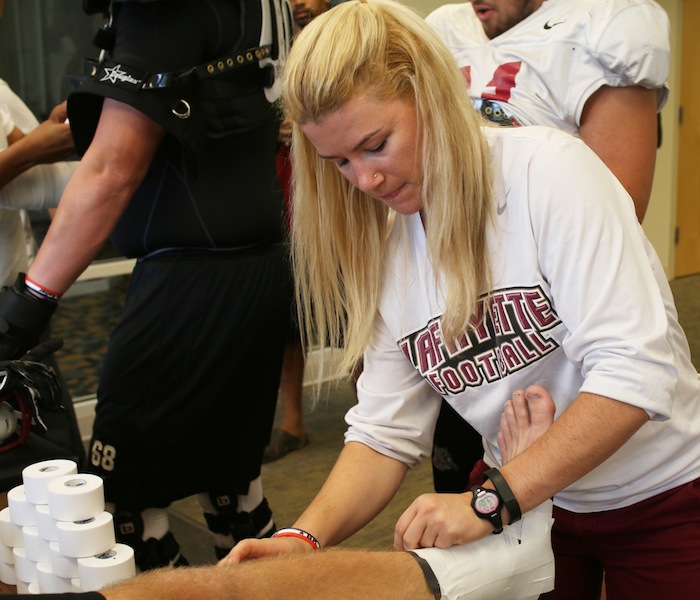Lafayette College has 23 varsity sports teams, but central to the success of these teams
is a 24th team—the Lafayette Sports Medicine team. They’re committed to the overall
health of the college’s roughly 530 student athletes.
The team is comprised of seven athletic trainers, two physicians, numerous work study
students, undergraduate and graduate workers, and an entire network of healthcare
providers throughout the Lehigh Valley.
Also connected to the Bailey Health Center and Director of Health Services Dr. Jerry
Goldstein, coordination between such a large team requires communication, most of
which is now done through an electronic medical record system.
Director of Sports Medicine Matt Bayly said the goal of the Sports Medicine team is to
maintain the overall well-being of each patient and keep all student-athletes as healthy
as possible at all times.
As such, they focus on providing expedient and patient-centered care. This includes not
only injury treatment, but monitoring diets, nutrition, supplements, medications and
behavioral health.
Bayly describes the seven athletic trainers as the go-to medical professional for student
athletes. In the sports medicine world, they are often referred to as the “gatekeeper” to
health care because of their baseline medical knowledge. Their responsibilities are vast
and commitment is a requirement.
A typical day for an athletic trainer at Lafayette starts at 9 a.m. and ends at about 7:30
p.m. Between nine and noon, they staff the training room and provide treatment to
student athletes.
The two hour period between noon and two is generally used to complete administrative
work but is often a period of time for student athletes who have no other time in their
day to receive treatment.
Around 3 p.m., each trainer generally prepares for their team’s practice. This entails
setting up the field with water and ice and preparing the student athletes for practice.
They stay for a half hour after practice ends to attend to players after training, which
usually takes them to about 7:30 at night.
Recently, the training room has extended its hours to begin at 7 in the morning to further
accommodate the busy academic and extracurricular schedules of the athletes. This
means that each trainer must begin work at the training room at 7 a.m. once a week. On
those days, they will work from 7 a.m. to 7:30 p.m., or 12 and a half hours.
On game days, trainers are required to be available to players far before game time. For
a 7 p.m. game, trainers will be in the training room at 3 in the afternoon, attend the
game and be available to players after the game ends. These games can go late and
make for a long night for the Lafayette training staff.
When available, trainers will also travel with team on away trips. They always travel with
the high risks sports, such as football and basketball, but will travel with all teams if
available. Some away trips last as long four to five days, where the trainers virtually
work full-time.
Assistant Athletic Trainer Jon Edwards, for example, has already gone on two full-
weekend away trips with the field hockey team this fall. This includes a trip to Virginia
that lasted from Thursday to Sunday evening.
Because there are 23 sports teams and seven trainers, each trainer is involved with
multiple teams. Edwards is the trainer for field hockey, men’s basketball, and track and
cross country. Bayly is mainly football and men’s lacrosse.
This allows the trainer to really get to know the players and the typical injuries for the
sport, which allows them to provide even better care. Some sports are split between all
of the trainers.
With so many responsibilities, it is clear that the job, like a Division I sport, requires
teamwork and dedication. The work that the trainers put into caring for athletes directly
helps them perform at their best.
For Bayly, being the first person an athlete turns to when they are injured and being the
person to help them out is rewarding. The relationships formed with athletes add
another level to the perks of the job.
What else is fulfilling about the job?
“Watching Lafayette win,” Bayly said.




































































































